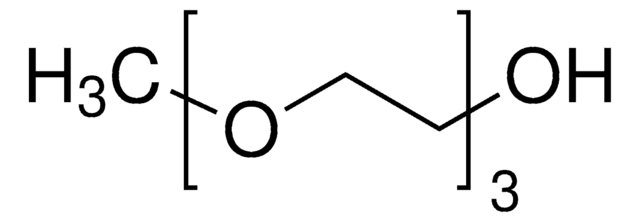579548
Diethylene glycol methyl ether
ReagentPlus®, ≥99.0%
Sinónimos:
2-(2-Methoxyethoxy)ethanol, Methyldiglycol
About This Item
Productos recomendados
vapor density
4.14 (vs air)
vapor pressure
0.2 mmHg ( 20 °C)
product line
ReagentPlus®
assay
≥99.0%
form
liquid
autoignition temp.
221 °C
expl. lim.
1.38-22.7 %
impurities
≤0.1% (water)
refractive index
n20/D 1.426 (lit.)
bp
194 °C (lit.)
mp
−70 °C (lit.)
density
1.023 g/mL at 25 °C (lit.)
SMILES string
COCCOCCO
InChI
1S/C5H12O3/c1-7-4-5-8-3-2-6/h6H,2-5H2,1H3
InChI key
SBASXUCJHJRPEV-UHFFFAOYSA-N
¿Está buscando productos similares? Visita Guía de comparación de productos
General description
Application
- Composition-explicit distillation curves of diesel fuel with glycol ether and glycol ester oxygenates: fuel analysis metrology to enable decreased particulate emissions.: Investigates the incorporation of diethylene glycol methyl ether into diesel fuels to reduce particulate emissions. This research is vital for environmental science, focusing on improving air quality and reducing the ecological impact of diesel engines (Smith BL et al., 2008).
Legal Information
signalword
Danger
hcodes
Hazard Classifications
Repr. 1B
Storage Class
6.1C - Combustible acute toxic Cat.3 / toxic compounds or compounds which causing chronic effects
wgk_germany
WGK 1
flash_point_f
188.6 °F - closed cup
flash_point_c
87 °C - closed cup
Certificados de análisis (COA)
Busque Certificados de análisis (COA) introduciendo el número de lote del producto. Los números de lote se encuentran en la etiqueta del producto después de las palabras «Lot» o «Batch»
¿Ya tiene este producto?
Encuentre la documentación para los productos que ha comprado recientemente en la Biblioteca de documentos.
Nuestro equipo de científicos tiene experiencia en todas las áreas de investigación: Ciencias de la vida, Ciencia de los materiales, Síntesis química, Cromatografía, Analítica y muchas otras.
Póngase en contacto con el Servicio técnico





